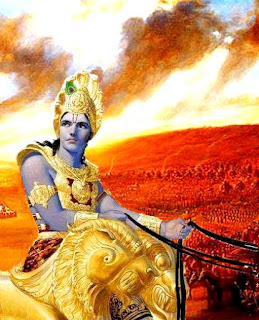
Visnu
Purana "One gopi looking at Govinda became extremely
joyful and began to repeatedly sing His name "Krsna! Krsna! Krsna!" She could say nothing else."
This poem was inspired by the power of chanting for transforming the heart, but also to suggest the need to be active in this process where many micro-results, like the stages of a ripening fruit,have to be achieved in order to steadily adding mature insights to our surrender.
This poem was inspired by the power of chanting for transforming the heart, but also to suggest the need to be active in this process where many micro-results, like the stages of a ripening fruit,have to be achieved in order to steadily adding mature insights to our surrender.
Caitanya
Bhagavata M.L. 28.27 "You all go now, utter the name
of Krishna, chant the name of Krishna, do krsna-bhajana. Don't think of anything else but
Krishna."
If
I do not call out to you
Krishna,
Krishna, Krishna,
how
could I stop listening
the
whispers
of
the weaknesses of my heart? (1)
while
my deluded mind
repeats
deceitfully
"you are just fine".
If
I do not cry for You
Krishna,
Krishna, Krishna,
feeling
helpless,
how
could I place in your hands
my
days ?
and
increase my faith
perceiving
Your benevolence
in
events and people
fostering
Your aid.
If
I, within myself,
do
not continue chanting
Krishna,
Krishna, Krishna,
how
could I carry my heart
to
the tender of Bhakti?
while the iron boat of conceit (3)
sinks into the eerie abyss
of treacherous hedonists ,
sinks into the eerie abyss
of treacherous hedonists ,
where I was again tricked.
If
my whole being does not resonate
Krishna,
Krishna, Krishna,
how
could you, in my heart,
awake
me to the emotion
so
to accept the truths
about
my soul, the creation and You?
I
would have no memory of (4)
nor
could I make of them any use.
But
if my tongue calls
Krishna,
Krishna, Krishna,
without
your name
resounding in my soul,
it
would not desist
from useless talks,
the
Ego's soliloquy
the
invective words,
how
then could it dance free
to
the sweetness of the songs
about your names and forms?
1) There are four kinds of Anartha (Vani Vaibhava of BVThakur)
: 1) identifying the body with the self 2) thirst for material enjoyment 3)
offensiveness 4) weakness of the heart.
Anarthas produced
from weakness of heart.
1) laziness 2)
subordination to insignificant objects; 3) bewilderment of heart due to
lamentation; 4) distraction from pure devotional service due to false argument;
5) miserliness in offering all one's energy to the cultivation of Krishna
consciousness; 6) rejection of humility due to the pride of caste, wealth,
education, followers, beauty, and strength; 7) willingness to be misguided by
irreligious propensities and instructions; 8) disinterest in rectifying
prejudice; 9) abandonment of compassion due to anger, illusion, envy; 10)
intolerance; 11) false identification of the self as a Vaisnava due to the
desire for name, fame, and the cheating propensity; 12) and the torture of
other living entities that arises from the desire to enjoy women, wealth and
other forms of sense gratification.
2) Skanda Purana "If a person rises in the morning and chants 'Krishna, Krishna', I shall bestow all welfare upon him."
When faith become deep (first tender then firm) transforms into steadiness (nishta), taste (ruci), attachment (rati or asakti) and bhava.
When faith become deep (first tender then firm) transforms into steadiness (nishta), taste (ruci), attachment (rati or asakti) and bhava.
3) ".....boarding a stone boat, and so too are those who blindly follow
them. A stone boat would be unable to float and would sink in the water with
its passengers. Similarly, those who mislead people go to hell, and their
followers go with them. " - Srimad Bhagavatam, Purport, 6.7.14
4)
Prema Bhakti-chandrika "Dhyana
is another word for smarana "






